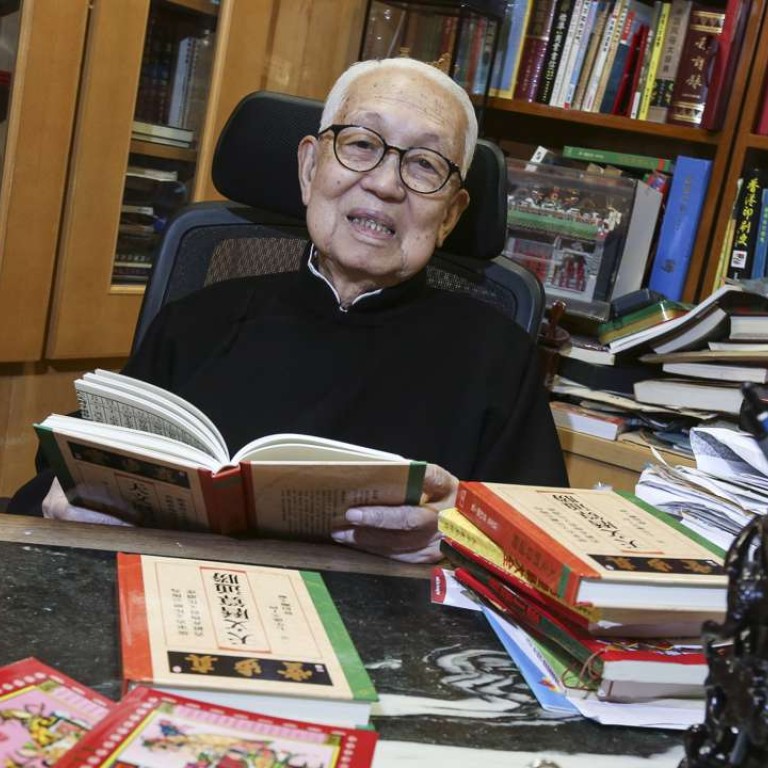
Soothsayer offers words of warning for Hong Kong leadership rivals in Year of the Rooster
Former financial secretary will have a ‘difficult time’, while Carrie Lam is advised to take a ‘softer line’ to avoid bad fortune
Hong Kong’s next leader can expect to enjoy a “largely easy” time in the Year of Rooster, according to renowned soothsayer Choi Park-lai, but he has some words of warning for the two main rivals in the chief executive election race.
“It is not good to be the messenger of bad news, but the sign is that rabbits will have a difficult time,” said Choi, referring to former financial secretary John Tsang Chun-wah, who was born in the Year of the Rabbit in 1951.
The 95-year-old master in Chinese astrology and geomancy said rabbits were tender and likeable, but according to the Chinese zodiac they are the enemies of roosters.
Watch your step. And you will see a smoother path
“But it is not the end of the world [for the rabbit],” Choi added. “Accept with grace the things to which fate binds you. Watch your step. And you will see a smoother path.”
As for former chief secretary Carrie Lam Cheng Yuet-ngor, seen as Beijing’s favourite by many, her bid will not be plain sailing. Born in the Year of Rooster in 1957, Lam is advised to take a “softer line” otherwise bad fortune may knock at the door.
“If you push too hard, it will just break,” Choi said.
The first candidate to enter the race for Hong Kong’s top job, retired judge Woo Kwok-hing, 71, is also a rooster, whose “tenderness will diminish the bad luck”, according to Choi.

“You may regard this as superstition. I am no prophet and I can’t change your fate, either. I can only point out to you a smoother path during your rainy days,” Choi said.
The astrology predicted the Occupy Central protests in 2014, and three years earlier he foretold that Henry Tang Ying-yen – then seen as Beijing’s choice for chief executive – would face “big trouble” because there were “vile people plotting against him”.
Tang eventually lost to Leung Chun-ying in the 2012 election after revelations that he had built a huge illegal basement at his home and had had extramarital affairs.
Choi also predicts that March will be an “unstable” month, with “conflicts” and “noisy disputes”. “Our chief executive election also falls in March. It seems to suggest it will be a tight race.”
“August and October will be difficult months, too. Otherwise, the rest of the year will be relatively stable. Our new chief executive can perhaps spare some time to plan Hong Kong’s development.”
Choi is the author of the Choi Gen Po Tong Chinese Almanac, which is used by many Chinese families to set dates for important events like weddings and the signing of contracts. The annual almanac was first published in the late Qing dynasty by his grandfather.
Choi inherited the family’s soothsaying knowledge and his almanac was honoured by the Guangdong government as intangible cultural heritage in 2013.
On a wall of his office hangs Chinese calligraphy written by David Akers-Jones, chief secretary of the British colonial government from 1985 to 1987. It reads “thorough knowledge of the three elements”, hailing Choi for his understanding of the elements of nature, earth, and man.
Among the rich and famous he has advised are tycoon Li Ka-shing, former chief executive Tung Chee-hwa and last Hong Kong governor Chris Patten.
As Choi’s knowledge brought him wealth and influence, he set up a charity fund – the Hong Kong Shun Lung Yan Chak Foundation – in 2006 to help needy people in the city and those in remote areas of poverty in China and Cambodia.
In recognition of his contribution to Chinese culture and charity, he was awarded the Gold Bauhinia Star medal by the Hong Kong government in 2015.

